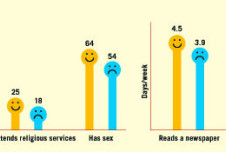“I’m good enough, I’m smart enough, and doggone it, people like me!” This was the mantra of Stuart Smalley, the sappy, self-help-obsessed character Al Franken created for Saturday Night Live. Smalley always seemed to be grappling with a profound lack of self-esteem, and no doubt he’s not alone. But new research suggests that, perhaps more importantly, Smalley and countless others like him really suffer from a self-compassion problem.
Self-compassion is a new psychological construct, developed by Kristin D. Neff, a professor of educational psychology at the University of Texas, Austin. According to Neff, self-compassion has three main components: self-kindness (going easy on yourself when you make a mistake); common humanity (viewing negative experiences as something everyone goes through); and mindful acceptance (viewing your flaws objectively and accepting them).
Several recent studies have explored the behaviors and traits that characterize self-compassion and that distinguish it from self-esteem. In a study published in the May issue of the Journal of Personality and Social Psychology, Duke University psychologists Mark Leary and Eleanor Tate examined how self-compassionate people judge themselves. They gave participants a questionnaire to determine how self-compassionate they were, then asked them to make up a story that began with the line, “Once upon a time, there was a little bear….” Leary and Tate filmed the participants telling these stories; afterwards, they had them watch the tape and rate their own performance, as well as the performances of two other people. Those who scored high in self-compassion were more likely to rate their performance similarly to the way others rated it, suggesting they see themselves the way others do. This differs from people high in self-esteem, who, in other experiments, have judged themselves more favorably than others did because of their inflated self-image.
Based on their findings, Leary and Tate propose that self-compassionate people accept their flaws but don’t become defensive or otherwise feel badly about them. But why?
In one of Neff’s studies, published in the August issue of the Journal of Research in Personality, she and her colleagues gave participants a variety of personality tests to find correlations between self-compassion and other traits. The results suggest that self-compassionate people are more likely to judge reality and themselves accurately; to be happy, optimistic, extroverted, and motivated; and to feel kindness toward others. They are also more likely to make changes that will lead to a more fulfilling life and to say they get along well with others.
Neff says that while some people might be innately more self-compassionate than others, she believes that, with practice, many more people can consciously boost their levels of self-compassion. “This may come through therapy, a spiritual practice, or by simply choosing to let go of the self-critical voice when it arises in our heads.”




Comments